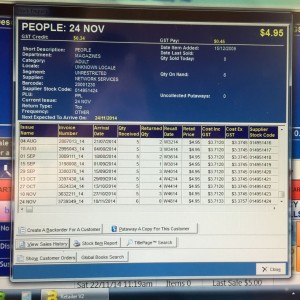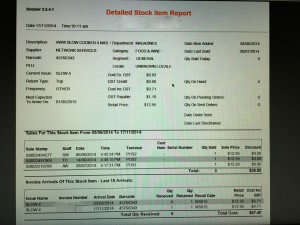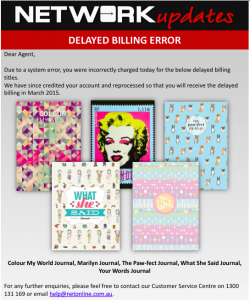Too many Christmas food magazines
 We have too many publishers publishing Christmas-themed specials. Some are publishing two and more. While I understand that publishers see this as an opportunity to extend the reach of their brand, we retailers need space to do the titles justice.
We have too many publishers publishing Christmas-themed specials. Some are publishing two and more. While I understand that publishers see this as an opportunity to extend the reach of their brand, we retailers need space to do the titles justice.
Our shelves are overflowing with Christmas themed titles.
I doubt we will see a net increase in sales of Christmas themed magazines. The extra range is driving churn among the titles and not making us any more money.
How to cut your end of month magazine bill
 This photo shows some of the magazines I took off the shelves for early return in one of my newsagencies on Saturday in my weekend cull.
This photo shows some of the magazines I took off the shelves for early return in one of my newsagencies on Saturday in my weekend cull.
Every Saturday I review all magazines on the shelves, considering the stock on hand, the length of time on the shelves already, the pressure on space and sales history.
The extent of the cull as shown in the photo is average for a Saturday.
Why Saturday? The pace in the shop is different, headspace is different, it’s a management function that for me works best away from everyday.
This is how I manage my magazine accounts – by culling to serve the needs of my business as opposed to the needs of publishers and distributors. The culling is considered, careful – focussing on monthly and longer on-sale titles, not top sellers but second tier and beyond titles.
If I am unsure about early returning a title I check sales history – I don’t want to cut myself out of certain sales.
I take care with publishers who actively support the newsagency channel and are fair in their allocations, publishers like Pacific Magazines.
The weekend cull an opportunity for a fresh eyes view. Being done by the owner of the business clarifies the goal – managing your magazine account.
I trained a newsagent on the weekend cull strategy recently and the result is a 50% cut in their magazine bills and no loss of sales. In their case this has freed up more than $10,000 in working capital, cash that was tied up in the systematic oversupply merry-go-round that is newsagency magazine supply.
If you are not doing this type of cull already and follow my advice, let me low how much cash you free up.
Note: I recommend against early returning the day stock arrives as there is nothing to be gained from this – unless you see gross oversupply.
Another example of Bauer Magazine oversupply
 I don’t want to be in a position to write this blog post. No, I want fair and justified magazine supply. I don’t want unjust treatment that is not based on data facts.
I don’t want to be in a position to write this blog post. No, I want fair and justified magazine supply. I don’t want unjust treatment that is not based on data facts.
My story plays out in thousands of newsagencies each week, costing our channel millions of dollars. It disadvantages us.
Click on the image – see for yourself evidence of Bauer oversupplying People. For no reason they increased our allocation by 1 copy. Okay 1 copy is not massive. But it is unnecessary, a waste and a cost to my business.
This is another example of the waste of newsagents sending sales data.
Actions like this increase in supply make us look stupid for working hard to send accurate sales data.
Magazine publishers ignore the channel that sells 50% of magazines in Australia
Newsagents do not have a voice at the Publishers Australia conference in Sydney this week – Publish – The Future of Print and Digital Publishing. It is a missed opportunity for our channel and publishers to talk about the future of print publications. The program looks terrific with sessions newsagents could engage in.
Bauer Media ignores newsagent sales data & sends extra stock when there is plenty in-store
 This is not a new story. What I describe here happens in newsagencies across Australia every week, many times over. It’s been happening for years. This is a crime. There appears little or no interest in key spiller businesses in fixing the issue.
This is not a new story. What I describe here happens in newsagencies across Australia every week, many times over. It’s been happening for years. This is a crime. There appears little or no interest in key spiller businesses in fixing the issue.
Shame on those involved as you are the people hurting small business newsagents and making us less competitive than others selling magazines. Shame on you.
Newsagents are pressured and penalised to provide sales data to magazine publishers so that those publishers can respond to demand and supply more appropriately. That’s the spin. Sadly, there is little evidence from some publishers that it is more than spin.
Bauer Media has been caught out again this week ignoring newsagent data and oversupplying a title with no justification for the supply.
While Bauer allocations people will have excuses, they are worthless as we have heard them before. Many newsagents feel that the company deliberately oversupplies to serve its won purposes.
Take a look at the image. You can see the initial supply of 8 copies of AWW Slow Cooker 4 on June 6, 2014. 1 copy was returned and 3 copies were sold on June 6, June 14 and July 20. yesterday, Bauer supplied an additional copy. The newsagent early returned it – incurring freight and labour costs. The newsagent was effectively fined by Bauer for Bauer’s own oversupply.
Warehouse, trucking and newsagent resources were wasted in this. It’s shameful.
Take a careful look at the image. This is data from the newsagency software being run in this newsagency treated so poorly by Bauer. Take a careful look at the detailed data in this small business. If this small business has access to such well-organised data and can access it in seconds then why not Bauer? Are newsagent IT systems better than Bauer’s IT systems? It would seem so. Either that or Bauer has the data and deliberately ignores it.
The example from this newsagency is one of many I receive regularly from our channel.
Okay it is only one extra copy of one title. Multiply that across our channel and not that it happens many times a year and you soon see the financial cost on newsagents for labour and freight plus the cash flow impact which I’d say is in the millions of dollars.
The newsagent held data is great for business management but it is bad in that it proves consistently poor allocation actions by Bauer against newsagents.
My experience is that no amount of complaining about institutional oversupply by Bauer will drive change within the business. Plenty of newsagents think this too and it’s a reason they strike out at the company with aggressive early returns of Bauer distributed titles.
Early returning is the only way we can effectively deal with this oversupply.
Publishers using Network and who are concerned about early returns could consider this when wondering why newsagents early return their titles.
Smart newsagents like the one who provided me their data have the evidence and they are getting angrier. I can understand them wanting to strike back.
Footnote: I have masked identifying details to protect the newsagent.
Code of conduct for magazine publishers and distributors
Magazine Publishers Australia and representatives of Pacific Magazines, Bauer Media, Network Services and Gordon an Gotch have been working on a possible code opt conduct for the supply of magazines to newsagents. This work was initiated by the publishers and has been in discussion for a year.
Any code is a complex process because it must have approval from the ACCC. Even the suppliers talking together requires ACCC approval.
As I have written here many times, a code is essential for the competitiveness of newsagents. Most recently, on August 30, I published my suggested magazine supply KPIs – these were first presented to publishers at a breakfast meeting in 2005.
Newsagents need to be part of the discussion of any possible code of conduct. Here is a draft of the MPA code of conduct. It may not be a current draft. I am not positing it here as a declaration of what will be put in place. No, I am publishing it here so newsagents can comment more generally on the topic of KPIs.
If you compare this code of conduct to my suggested magazine supply KPIs you will see the MPA draft is biased to serve the publisher whereas mine is biased to serve the newsagent. I think the MPA code needs some more work but it is a start. For example, the financial viability of a title in a newsagency has nothing to do with the size of the print run … the ideal sales efficiency has nothing to do with the size of a print run.
I’d also note: early returns are essential to cash-flow management in newsagencies. If Network and Gotch want to be paid they must allow early returns. If a title has not sold in two weeks it ought to be a reasonable candidate for early return.
Publishers and distributors need to understand that delayed billing is of little benefit to newsagents.
Since we carry the space, labour and financial obligation, we need a supply model that allows us to take on such obligations.
Here is a draft of what the MPA has been discussing:
1. Minimum Sales Efficiency
A Distributor will ensure that no Title has a Sales Efficiency of less than the minimum Sales Efficiency set out in the table below.
Distribution quantity per Issue Minimum Sales Efficiency
>..30,000 copies 55%
20,000 copies – 30,000 copies 50%
10,000 copies – 20,000 copies 45%
1,000 copies – 10,000 copies 35%
< 1,000 copies 25%
2. Consecutive Nil Sales
A Distributor will cease to distribute a Title to a Retailer for a minimum of 12 months if the Title has experienced consecutive nil sales at that Retailer for, in the case of:
a) a weekly Title, six consecutive Issues;
b) a fortnightly or monthly Title, four consecutive Issues; and
c) any other Titles, two consecutive Issues.
3. Returns
A Distributor will not require Retailers to provide Full Copy Returns, except in relation to Partworks.
A Distributor may require that Retailers provide, at the Retailers’ expense, Mastheads as evidence of unsold copies of an Issue and may require that Retailers:
a) package such Mastheads separately from any permitted Full Copy Returns; and
b) clearly mark packages containing Mastheads or Full Copy Returns as ‘Mastheads’ or ‘Full Copy Returns’, as applicable.
4. Early Returns
A Distributor will not be required to accept Early Returns from Retailers, except where such Early Return is made by a Retailer to correct an error in allocations quantity.
5. Redistributions – Packs & singles
A Distributor will not Redistribute an Issue on more than once occasion.
If a Distributor Redistributes an Issue, the Distributor will ensure that:
a) the prior distribution of the Issue has Closed;
b) at the date of the Redistribution, less than 12 months has elapsed since the Recall Date applicable to the first distribution of the Issue;
c) the number of copies of the Issue provided to a Retailer is less than the number of copies provided to that Retailer as part of the first distribution of the Issue (unless the first distribution of the Issue was a sell-out at that Retailer); and
d) the On-sale Period for the Redistributed copies of the Issue is no more than three months.
If a Distributor Redistributes an Issue, the Distributor will use reasonable endeavours to ensure that:
a) the Issue does containing cover offers that have expired; and
b) if the Issue is bagged and no current Issue is included (e.g. a “Value Pack” of two old Issues), this is clearly communicated to consumers on the packaging.
6. New Titles
For each launch of a New Title, a Distributor will ensure that:
a) each Retailer receives notification of the launch prior to the On-sale Date for the Launch Issue; and
b) the number of copies of the Launch Issue distributed to each Retailer is determined reasonably having regard to the total print run of the Launch Issue and the average sales of 1 or more equivalent Titles (provided that a Distributor may distribute at least 2 copies of the Launch Issue to each Retailer).
For Issues of a New Title subsequent to the Launch Issue, a Distributor will, to the extent such data is available, use EDI sales data to determine the appropriate number of copies of those Issues to be distributed to each Retailer until a regular sales pattern for the New Title is established.
7. Maximum shelf life
A Distributor will ensure that the On-sale Period for an Issue does not exceed twelve weeks unless at least two of the following are applied to the Issue:
a) delayed billing, being the process by which …;
b) Retailers are offered an extra sales margin for sales of the Issue on top of the standard sales margin normally paid by that Distributor to Retailers; and
c) Split Deliveries.
8. Split Deliveries
A Distributor may utilise Split Deliveries for an Issue.
If a Distributor utilises Split Deliveries, the Distributor will ensure that:
a) to the extent such data is available, the Distributor uses EDI sales data to determine the appropriate number of copies of the Issue to be delivered to each Retailer for the second or subsequent deliveries; and
b) based on the rate of sales, if a Retailer has sufficient copies of the Issue available for sale to consumers, then a second or subsequent delivery should does not occur.
Here are definitions from the Code which could be useful reading this:
Closed means, in relation to an Issue, ….
Code means this Distributor Code of Conduct.
Distributor means a person engaged in the business of distribution of Titles and who is a signatory to this Code.
Early Returns means the return of a copy of an Issue, in the case of:
- a weekly, fortnightly or monthly Title, during the On-sale Period; and
- any other Title, Returned within 30 days from the On-sale Date.
Full Copy Returns means:
- the process by which a Retailer returns an entire copy of an Issue to the Distributor; or
- the entire copy of the returned Issue,
as the context requires.
Issue means an issue of a Title.
Launch Issue means the first issue of a New Title.
Mastheads means headers, the front cover or the barcode of a copy of an Issue that have been excised from the copy of the Issue.
New Title means any Title that is distributed under a Product Code that has not previously been used.
On-sale Date means, in respect of an Issue, the date, determined by the relevant Distributor, on which the Issue is first made available for sale to consumers by Retailers.
On-sale Period means, in respect of an Issue, the period commencing on On-sale Date and ending on the Recall Date.
Partwork means ….
Product Code means ….
Recall Date means, in respect of an Issue, the date, determined by the relevant Distributor, on which the Issue is required to be withdrawn from sale to consumers by Retailers.
Redistribute means the distribution to Retailers of an Issue that has previously distributed and recalled (using refurbished Full Copy Returns or mint copies of the Issue).
Retailer means a newsagency, supermarket, convenience store or other retailer to which Titles are delivered by a Distributor as a regular distribution channel.
Sales Efficiency means the total number of copies of an Issue sold by Retailers expressed as a percentage of the total number of copies of the Issue distributed to Retailers [averaged over, in the case of:
- a weekly Title, four consecutive Issues;
- a fortnightly or monthly Title, three consecutive Issues; and
- any other Title, two consecutive Issues.]
Split Deliveries means the distribution of an Issue by more than one delivery of copies of the Issue to Retailers during the On-sale Period.
Title means a magazine or similar periodical and, for the avoidance of doubt, excludes books.
What a waste Bauer distributing this Ripley’s book
 The anger from the newsagent reporting receiving this Ripley’s book from Bauer’s network Services this week was palpable. The RRP $29.95 title had no place in the scale out from a magazine distributor.
The anger from the newsagent reporting receiving this Ripley’s book from Bauer’s network Services this week was palpable. The RRP $29.95 title had no place in the scale out from a magazine distributor.
Newsagents can get books like this elsewhere at 50% and more GP and with more control over supply. Any book supplier using a magazine distributor to access newsagents should think twice.
This title was early returned – what a waste of time and money!
Newsagents – beware duplicate barcodes
Network Servcies has two titles out this week with the same barcodes. This is a dreadful error by the publishers.
03/11/2014 – THE CLASSIC MOTORCYCLE
Bipad 3748 Issue 201401
Correct Barcode 978099258495506/11/2014 – GUIDE TO THE CRICKET WORLD CUP
Bipad 3817 Issue 201401
Correct Barcode 9780992584948
Make sure you handle this according to advice from your newsagency software supplier otherwise your returns credits could be affected..
Why the re-issue of the Ashes magazine?
 Did you receive the reissue of The Ashes magazine? This old title has had its day and reissuing to newsagents as happened this week is a space and money grab.
Did you receive the reissue of The Ashes magazine? This old title has had its day and reissuing to newsagents as happened this week is a space and money grab.
Had we been asked I suspect many newsagents would have said no thanks, been there, done that.
This is a perfect example of how magazine distributors make newsagents less competitive than supermarkets.
Justified early returns
 We had no space for the additional SKU from Bauer – Elle and Bazaar and so we early returned them. What’s unfair is that we have to send back the whole bag. What a waste of my money! I know newsagents who compensate by early returning other titles for ‘balance’. Asking me if I have room for a new SKU would be a smarter move Bauer.
We had no space for the additional SKU from Bauer – Elle and Bazaar and so we early returned them. What’s unfair is that we have to send back the whole bag. What a waste of my money! I know newsagents who compensate by early returning other titles for ‘balance’. Asking me if I have room for a new SKU would be a smarter move Bauer.
Nic & Rocco reissue of damaged stock by Bauer wastes newsagent time and money
 Almost a year ago, Bauer Media issued Nic & Rocco Sweet Sensations. I blogged about it at the time. Today, they sent it out again. This time it’s stock that has been around the block. Many copies are damaged.
Almost a year ago, Bauer Media issued Nic & Rocco Sweet Sensations. I blogged about it at the time. Today, they sent it out again. This time it’s stock that has been around the block. Many copies are damaged.
What a waste of time and money! What an appalling and unfair treatment of newsagents. I consider it to be unethical.
There should be no reissue of any title without newsagent permission. Bauer demands we pay them on time yet they do not provide reasonable levers with which to control our level of indebtedness.
Shame on those at Bauer who facilitated this abuse of newsagents.
I’m early returning Nic & Rocco Sweet Sensations.
I don’t want Inside Out
 With the arrangement between News Life Media and Coles which sees Inside Out magazine priced at $2.00 less in Coles than my newsagency and with two Coles curer markets in my centre I see no point in carrying this title and promoting my business as being more expensive. More important, I need to make a stand to the publisher who disrespected our channel with their Coles deal.
With the arrangement between News Life Media and Coles which sees Inside Out magazine priced at $2.00 less in Coles than my newsagency and with two Coles curer markets in my centre I see no point in carrying this title and promoting my business as being more expensive. More important, I need to make a stand to the publisher who disrespected our channel with their Coles deal.
ANF offers emotion over leadership to newsagents on magazine oversupply
At the ANF’s National Newsagent blog this week, under the headline of My heart bleeds for these newsagents, the ANF published a letter from a Western Australian newsagent about magazine supply issues including oversupply. Rather than providing leadership on the issue, what is supposed to be the peak body of the newsagency channel offers emotion and “sympathy”.
This post from the ANF reflects the extraordinary failure of the ANF to serve newsagents. It shows why newsagents should save their money and cancel their membership of this organisation which is bereft of ideas for addressing the single most important issue facing newsagents, as voted by newsagents.
The ANF opens the post, before publishing the letter, with:
… and all the other newsagents who write in with the same story. It is so depressing that such distribution practices almost bring these small businesses down and cause them turn away from magazines. What do you think they should do?
Saying it is depressing is unhelpful. Asking newsagents what to do is ridiculous – you know what they think. This was your moment to be a leader!
The ANF representative says in one comment at the end of the post that the ANF is working strategically with the MPA. My understanding is that the MPA has been working for some time and only recently has the ANF become involved. That project, while welcome, is unlikely to address what newsagents need addressed.
Here is what I would have said to the newsagent had they written to me as they did to the ANF.
Dear newsagent,
Thank you for sharing your story. It is one we hear often. Your situation is not unique. The vast majority of newsagents face similar competition pressures.
While it can be hard to confront, you need to face your situation with the knowledge that you chose this, you chose to purchase your business, you chose to sign the magazine supply contracts. I will do everything possible to help, but resolving your situation starts and ends with you.
Lobbying government will not help as politicians care less about small business. Sure they will sit and listen to us but they will not change legislation for us. The ACCC, too, over the years has proved good at listening and a failure at even trying to understand the unfair competitive situation in which we find ourselves.
At the core of the magazine distribution system is a set of practices imposed on newsagents by magazine distributors that are from an era of regulation, monopoly, where they were appropriate. In 1999, when the distribution of magazines were deregulated, those involved, including the ANF at the time, agreed a framework that disadvantaged newsagents. That framework continues today. It is unlikely you or anyone can change it. So, your focus has to be on mitigating your own situation.
The only parties with which you have a contract are the magazine distributors. They need to be the focus of your attention. They are tricking companies, paid for each parcel they shift through their warehouses and on the vehicles they contract. The more parcels they shift the more money they make. It suits their business model to move as many parcels as possible and care less about why they are moving parcels.
In your letter, you mention subscriptions. Let go of this. They have always existed and will always exist. They chase a different shopper. Yes, they are cheaper. However, those buying them are not likely to be your customer. Worry more about what you can change.
With all due respect, you need to take the emotion out of the situation. For example, your question Lastly do these companies understand how many hours a week we devote to their magazines in our stores? is not relevant to any discussion on oversupply. Yes, I understand you invest more time than is warranted and that if this were added to your business costs, magazines would most likely be loss making.
Take the emotion out of your letter and start again.
If you are being consistently oversupplied, write to the offending distributor(s) and seek a change in behaviour. Ask for a response in seven days. Provide examples where you have received more than 50% above what you would reasonably sell of a title. Explain that this consistent oversupply is, in your view, unfair treatment of your small business and that you feel powerless to alter their behaviour. Ask for a review of supply to terms you consider are acceptable.
While they consider your letter, gather your evidence. Use your computer system to produce a sell through rates report by distributor. If this shows long-term gross oversupply, it becomes vital evidence for your next step. If you don’t have a computer system you will need to manually gather the evidence.
Once the seven days is up, take the matter to the Small Business Commissioner, apply to have your dispute mediated. This will bring you and those you complain about to the table. You should file a separate request for each distributor if you have evidence of sustained misbehaviour.
Send a copy of your correspondence to the distributors and your evidence to the ACCC with a covering letter explaining what the reports show – sustained oversupply of product that makes your independent small business less competitive than your nearby supermarkets.
Stick to the facts. Use the state and federal government departments but always communicate with them on the basis of facts.
While you do all of this, plan for your future. Create a newsagency that brings in traffic for items outside newspapers, magazines and lotteries. Create a business that is known for other things over which you have more control.
I know of newsagencies in towns of 2,500 people where the businesses are enjoying excellent growth. It can be achieved by you being a leader of your business.
Complaining cannot be part of a business plan. A business plan requires tangible action points. In this letter I outline specific actions you can take. I will gladly help you with any of the steps covered. But remember, no emotion. regardless of your faith, remembering the Serenity Prayer can be useful through this: God, grant me the serenity to accept the things I cannot change, The courage to change the things I can, And the wisdom to know the difference.
If you know who wrote to the ANF, please pass this letter on to them. Let them know I’d gladly help them through the steps outlined.
Newsagents can achieve more individually on the issue of magazine oversupply than they think. It takes planning and commitment. It requires a whole of business approach not only to magazines but what else you could do to bring traffic into the shop.
The issues outlined by the newsagent in Western Australia are not new. The ANF has held countless meetings and strategy sessions on the issues. It has achieved nothing. It is time for newsagents to deal with these issues themselves.
Meeting with XchangeIT
I met with Chris Leach the CEO of XchangeIT today as part of a regular discussion Chris has with the various newsagency software companies.
I took the opportunity to express concern that newsagents are pressured to provide accurate sales data yet we see little benefit in return.
While it is outside his purview, Chris listened as I outlined the magazine supply issues I have canvassed here on this blog this week and previously. I made the point that the failure of magazine distributors to supply based on accurate sales data leaves newsagents questioning the value of providing accurate sales data and the impact this has on perceptions of XchangeIT.
The shareholders of XchangeIT – magazine distributors and the ANF – need to affect change by magazine distributors if they are to have newsagents provide access to more accurate data.
They need to ensure that newsagents are supplied based on sales data and not supplied to serve the commercial interests of distributors.
The examples this week of gross oversupply of Top Gear reflect a disregard for good data provided by newsagents through XchangeIT. The supply by Bauer of unwarranted extra stock besmirches the reputation of XchangeIT. It is disappointing that those involved appear to be uninterested.
Newsagents caring less about accurate data as a result of worsening magazine oversupply
A newsagents who recently got pinged by XchangeIT for failing to meet their standards expressed anger at abuse of their business by the imagine distributors for overloading them with stock.
Digging into the situation, there was no issue with data quality, just timing. So, the distributors receive accurate sales and return data but it is not always delivered the same day.
In the data from the business I can see more than 60% of titles are oversupplied. That is, for more than 60% of titles this business receives 50% or more stock than they would usually sell.
No wonder the newsagent does’t trust XchangeIT. It is supposed to lead to fairer data-based allocations. That is clearly not the case.
With newsagents more acutely aware of business performance at the product category level than at any time in their past, it is reasonable that the performance of XchangeIT come into scrutiny. All of the attention to accurately recording sales and returns has to play out as a business outcome at some point. Unfortunately, for too many newsagents, the outcome is continued oversupply.
The risk is that newsagents will care less and less about magazines and about XchangeIT – unless this is resolved. But what does resolution look like?
Newsagents deserve:
- Equitable supply massed on sales data with an acceptable gap between recent net average sales and supply. I’d suggest no more than 20%.
- No new titles unless approved.
- Ability to cut a title (in quantity or completely) immediately and without needing to seek permission.
- No on-sales greater than 30 days.
- No physical return of unsold stock.
- Financial penalties for titles that achieve a sell through of vower than an agreed level. I’d suggest 70%.
- Financial penalties for SBR supply where there is no data to support it.
Magazine distributors hold newsagents accountable for their level of indebtedness yet they provide no reasonable mechanisms through which we can control our level of indebtedness. Oversupply is akin to them taking interest free loans from us without permission.
Is it unethical to send more stock of a title a newsagent without justification?
Imagine the surprise of a newsagent this week when they received additional stock of Modern Wedding Styling magazine when they still had stock on the shelves from the August allocation. There is no sales history to indicate they will get through the initial allocation. So, the newsagent topped the supply this week and early returned it.
The newsagent has lost time and money on unwarranted allocation. The publisher has copped the cost of shipping out the stock that was topped this week. They will probably cop a return fee and maybe a topping fee.
The distributor could have saved the publisher and newsagent costs had they used the data they have from this newsagent and not sent the extra stock in the first case.
What happened in this situation could be considered to be a poor allocations, poor management or deliberately actions to generate fees for the magazine distributor.
It’s say it’s not a poor system as that’s an excuse Network has used for decades.
It’s say it’s not poor management because network has had plenty of time to address that.
I think the supply reflects a commercial decision to apply and this is what I’d label unethical. Whoever participated in or facilitated this situation ought to be ashamed of themselves.
This is another example that makes a mockery of the pressure newsagents are put under by XchangeIT for data accuracy. There is no evidence of magazine distributors being put under similar pressure.
Evidence Bauer Media sales based replenishment of magazines to newsagents is not based on sales data
Thank you for sending your sales data.
Based on the information you have provided, we have raised an extra order on your behalf.
This order will be delivered to you on the next available delivery day.
Outlined below is a list of what the order will contain.
This is the opening of an email this week from Bauer to a newsagent. The Sales Based Replenishment (SBR) system / experts at Bauer advised he was getting two additional copies of Top Gear. The problem is, he has only sold two copies and has four copies of the initial supply in-store. The sales data sent to Bauer was for the two copies. This is not evidence to support the Bauer claim to supply more. Their email is wrong, it makes this newsagent trust them even less.
It’s not the first time Bauer has said the sales data made them do it to justify sending extra stock. Nor is this newsagency the only one in Australia to receive such an email from Bauer where there is no evidence in the sales data to support the claim.
This action makes Bauer’s systems look broken and their allocations people stupid or deliberately abusing newsagents to serve the company.
My suspicion is that the Bauer SBR system, if it is a system, is broken and raising new allocations without any evidence – causing newsagents to incur more costs over which they have no control and for which they are 100% liable.
This is unfair. It disadvantages our channel. It makes us less competitive against supermarkets.
Looking at Top Gear sales for this newsagency for 2014, I see no evidence in the data for the newsagent to be suppliers more than three copies each month yet the initial Bauer allocation is six copies. Then, weeks into the month, they allocate two more.
No wonder this newsagent does not trust Bauer. The data informs his position on this.
This is another example that makes a mockery of the pressure newsagents are put under by XchangeIT for data accuracy. There is no evidence of magazine distributors being put under similar pressure.
Magazine publishers who make supermarkets more appealing than newsagents risk the future of our channel
For years there have been differences between how suppliers who supply newsagents and supermarkets with the same products treat these competing retail channels. While newsagents have complained, they have done nothing about it. I think we are approaching a time when we will need to act.
The challenges now are about much more than better gifts with purchase for supermarket shoppers.
The supply model used today disadvantages newsagents as it encumbers our businesses with financial,. labour and space costs that our competitors do not have. But even that is not why I say we are approaching a tipping point.
Price is the issue. More and more I am seeing different pricing in supermarkets for titles we sell in newsagencies. News Life Media and Bauer Media are the main publishers engaged in this. They must be doing it to drive traffic to supermarkets and away from newsagents for their products. Why else would they make their products so much cheaper in our competitors?
Why price Inside Out $2.00 less in Coles than the newsagency 50 metres away?
Why bundle weekly Bauer titles in supermarkets at a discount to nearby newsagents?
The only reason can be to drive supermarket sales.
Think abut the long-term implications – either newsagencies close or they reduce their reliance on magazines. What that may not hurt many of the titles sold by Bauer and News Life Media, it will hurt them and it will hurt many other publishers.
Today, the Australian newsagency channel is the largest single magazine retail channel in the country. But for how much longer? Those publishers who appear hell-bent on directing shoppers away from us need to consider the bigger picture for all publishers as well as for small business newsagents and the vital and quintessentially Australian role they play in there communities. Thankfully, not all publishers are so inclined to kill our channel.
Publishers: every action you take against us makes magazines less profitable for us and informs our own actions. Every time you facilitate supermarkets presenting your product as better value from them you harm our businesses. You’ll blame us when we are less interested in your products or quit as you have blamed us in the past, not thinking for a moment about the role you played in us deciding as we have done.
Every benefit you give supermarkets, every time you make them more appealing than newsagents is another decision against the future of the Australian newsagency channel. Shame on you as we have served you well. It is newsagents who have been key to your success and newsagents off of whom you make more money.
Network fixed journal delayed billing error
 Network Services late this afternoon issues an email to newsagents advising that the journals distributed today from Universal magazines are , indeed, delay billed. While this is welcome news I suspect some newsagents will have processed returns already – because of lack of advice from Network and because they don’t need journals at sub-par margin.
Network Services late this afternoon issues an email to newsagents advising that the journals distributed today from Universal magazines are , indeed, delay billed. While this is welcome news I suspect some newsagents will have processed returns already – because of lack of advice from Network and because they don’t need journals at sub-par margin.
Newsagents frustrated at journal supply
 I’ve heard from several newsagents about the Paper Pocket branded journals received today from Network Services. These are from Universal Magazines. They are part of the calendar offer newsagents were given the opportunity to opt out of. Billing is delayed. While they are 33% margin, that’s short of where they need to be to be interesting to many newsagents. I have suggested to Universal that instead of opt out, they go with opt in. They are reviewing distribution plans for next year.
I’ve heard from several newsagents about the Paper Pocket branded journals received today from Network Services. These are from Universal Magazines. They are part of the calendar offer newsagents were given the opportunity to opt out of. Billing is delayed. While they are 33% margin, that’s short of where they need to be to be interesting to many newsagents. I have suggested to Universal that instead of opt out, they go with opt in. They are reviewing distribution plans for next year.
The products themselves look good. It’s the terms and the push model that frustrate newsagents.
It’s a mystery
 Network Services sent us a new product: Bungees. Mystery Pack it says. Well, it’s a mystery to us why they would send us this item. No thanks. 25% if an offensively low GP for a toy item. It makes us less competitive when suppliers send us unrequested product that it not appropriate to our business model.
Network Services sent us a new product: Bungees. Mystery Pack it says. Well, it’s a mystery to us why they would send us this item. No thanks. 25% if an offensively low GP for a toy item. It makes us less competitive when suppliers send us unrequested product that it not appropriate to our business model.
We need faster access to licenced product
 Frozen is the latest licence to take off, delivering extraordinary results around the world. From clothing to greeting cards to dolls to activity cards. There is more Frozen product for sale newsagencies in the UK than is currently the case in Australia. Those involved in the supply chain to Australian newsagents need to reduce the time it takes for us to have access to these products. Do this and we will sell more.
Frozen is the latest licence to take off, delivering extraordinary results around the world. From clothing to greeting cards to dolls to activity cards. There is more Frozen product for sale newsagencies in the UK than is currently the case in Australia. Those involved in the supply chain to Australian newsagents need to reduce the time it takes for us to have access to these products. Do this and we will sell more.
![image[3] copy](http://www.newsagencyblog.com.au/wp-content/uploads/2014/12/image3-copy-300x285.png)
![image[1] copy](http://www.newsagencyblog.com.au/wp-content/uploads/2014/12/image1-copy-300x289.png)
